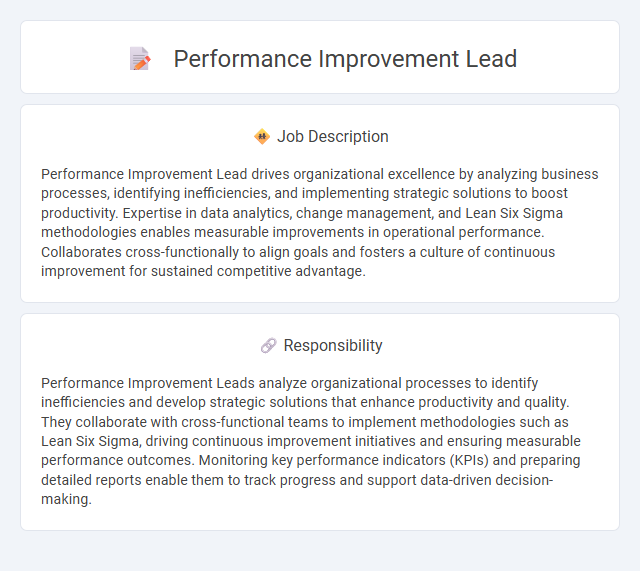
Performance Improvement Lead drives organizational excellence by analyzing business processes, identifying inefficiencies, and implementing strategic solutions to boost productivity. Expertise in data analytics, change management, and Lean Six Sigma methodologies enables measurable improvements in operational performance. Collaborates cross-functionally to align goals and fosters a culture of continuous improvement for sustained competitive advantage.
Candidates with strong analytical skills and a passion for driving change are likely to thrive as a Performance Improvement Lead, as the role demands continuous evaluation of processes and implementation of effective strategies. Individuals comfortable working in dynamic, collaborative environments may find this position well-suited to their strengths, given the necessity to engage multiple stakeholders for successful outcomes. Those who prefer routine tasks or minimal interaction might find the job challenging due to its emphasis on problem-solving and communication.
Qualification
A Performance Improvement Lead typically requires a bachelor's degree in business administration, engineering, or a related field, along with certifications such as Lean Six Sigma or PMP. Proven experience in process optimization, data analysis, and project management is essential for driving measurable improvements. Strong leadership, communication skills, and proficiency in performance metrics tools enhance success in this role.
Responsibility
Performance Improvement Leads analyze organizational processes to identify inefficiencies and develop strategic solutions that enhance productivity and quality. They collaborate with cross-functional teams to implement methodologies such as Lean Six Sigma, driving continuous improvement initiatives and ensuring measurable performance outcomes. Monitoring key performance indicators (KPIs) and preparing detailed reports enable them to track progress and support data-driven decision-making.
Benefit
Performance Improvement Leads likely enhance organizational efficiency by identifying bottlenecks and streamlining processes, which may result in cost savings and higher productivity. Their strategic guidance probably supports teams in adopting best practices and innovative solutions, potentially boosting overall employee performance and satisfaction. Companies engaging these experts might experience improved customer outcomes and sustained competitive advantage over time.
Challenge
Performance Improvement Lead roles often require the ability to tackle complex organizational challenges that hinder efficiency and productivity. This position likely demands strategic thinking and problem-solving skills to identify root causes of performance gaps and implement effective solutions. Success in this role probably depends on navigating resistance to change and managing cross-functional collaboration under pressure.
Career Advancement
A Performance Improvement Lead drives organizational success by identifying inefficiencies and implementing strategic solutions that enhance productivity and operational excellence. Mastery in data analysis, change management, and cross-functional collaboration fuels career advancement opportunities into executive roles such as Director of Operations or Chief Performance Officer. Developing expertise in performance metrics and leadership skills positions professionals for increased responsibility and influence within dynamic business environments.
 kuljobs.com
kuljobs.com